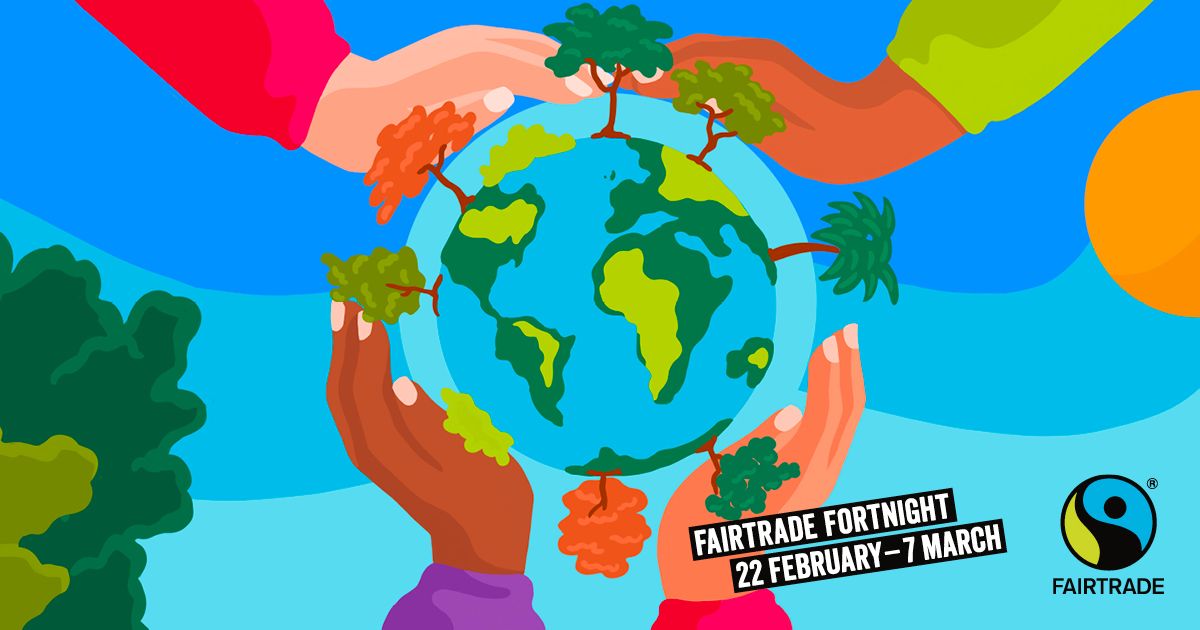Fairtrade Fortnight 2021 (running from 22 February to 7 March) is in full swing, and the Scottish Fair Trade Forum is one of the many organisations taking part. Read on to discover why climate is being placed at the heart of this year’s Fairtrade Fortnight campaign, and find out how you can get involved too.
Fairtrade Fortnight is as important as ever. The majority of us may be at home, but we are still relying on and buying essential items thanks to the dedication of key workers. But key workers at the start of many supply chains are struggling.
Farmers of crops such as tea, coffee and cocoa are still being paid poorly for their produce and work. On top of that, they face low, volatile market prices and rising production costs. Workers who make our products and clothes also face low wages and dangerous conditions, and have little power in the multimillion-pound supply chains they supply to.
And worryingly, alongside the coronavirus crisis and market challenges, the climate crisis is intensifying.
Farmers tell us that they are feeling the effects of climate change now, with freak weather, extreme rainfall, prolonged dry seasons and increasing prevalence of plant diseases all affecting their crops. A farmer from a Fair Trade cooperative in Malawi told us:
‘Climate change means there are now seasons when the harvest fails. If this happens the immediate impact is hunger for the already vulnerable families.’
Fairtrade coffee farmer, Bayardo Betanco of the Prodecoop co-operative in Nicaragua, said:
‘There is a chain on earth that starts where the producers are. They are the ones who suffer the consequences of climate change, the ones who get the least help, and carry all of the burden. It’s not fair.’
To rub salt into the wound, we know that countries such as Malawi and Nicaragua have contributed very little to global greenhouse gas emissions and climate change compared to more industrialised nations such as the UK.
Here in Scotland, as a nation of people which has come to love tea, coffee, bananas and cocoa, and which sources many other foods from overseas, these crises have the potential to affect us too. If we don’t take action now, availability of products such as coffee could decline to the extent that they become luxury items.
According to the Fairtrade Foundation, if current rates of warming continue, it is predicted that by 2050:
- As much as 50% of global land currently used for coffee farming may no longer be suitable
- Adverse climate conditions will trigger a drastic decline in bananas yields in 10 countries
- Many regions in Ghana and Côte d’Ivoire, who produce over half the world’s cocoa, will become too hot to grow the crop.
For these reasons, now, more than ever, we need to ensure that farmers receive fair pay, prices, and have power to make their own choices, meet their everyday needs and deal with the challenges of posed by climate change.
With Fairtrade, farmers get a fair price and can respond better to the effects of climate change that they are facing now.
With Fairtrade, farmers and workers have a voice and this year, we will do everything we can to ensure that their voices are heard at the climate talks that their livelihoods depend on.
In Scotland, we can also do more. Whilst ensuring that more money and reaches farmers and workers through Fairtrade, we can ensure that the burden of responsibility and regulation is not placed on already vulnerable communities. We, in richer, industrialised nations and as contributors to climate change, must also take and urge urgent action to drive down emissions. That is why we support the Fairtrade Foundations’s call to the UK government to stop dumping our emissions on poorer countries and ensure the government’s trade policy helps, not hinders, the path to net zero.
It is also why we are part of Stop Climate Chaos Scotland and support the climate justice work of the Alliance and its members and partners in the run up to COP26.
Whilst the idea of radically and urgently changing the way we do business and trade to respond to the climate emergency and build back better may seem like an overwhelming challenge, we know it must be done and the Fair Trade model provides a framework on which to build for that new way of working. It is an example of how we can trade can do business with the interest of people and our planet at the forefront.
At this critical juncture point for our planet, Fair Trade is providing a lifeline for farmers and workers, and a blueprint of how we can do things better in the future. This Fairtrade Fortnight, we invite you to join the movement and drive for change.
Here are five ways you can get involved:
1. Share our new campaign animation about trade and climate justice.
2. Take inspiration from Ben & Jerry’s, The Co-op, Cafédirect and Fairtrade Africa on this Fairtrade one-hour webinar on Tuesday 2 March at 11.30am.
3. Use our suppliers map to find an independent Fair Trade suppliers near you. These suppliers could help you source Fair Trade tea, coffee, corporate gifts and more.
4. Read the report: A Climate of Crisis: Farmers, Our Food and the Fight for Justice.
5. Sign up to our newsletter to stay connected and involved:
_____
Colleen Tait, the Scottish Fair Trade Forum


